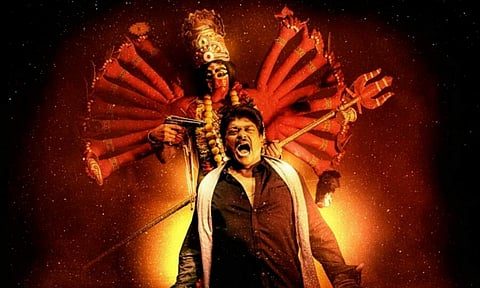Iravin Nizhal Movie Review: An admirable filmmaking experiment
Rating:(3.5 / 5)
Iravin Nizhal is a unique experience—that’s for sure. For starters, the first half of the film concerns itself with showing us the minor errors involved in the making of what’s called the ‘world’s first non-linear single-take film’. The first half is about the diligence of a filmmaker who goes through multiple iterations of shooting and dealing with minor errors, while the second half is where the actual film begins playing—one that’s about a character suffering so much that he wishes he were never born. In the first half, we root for Parthiban, the director, and in the second, we root for Parthiban, the actor, playing Nandu.
Director: R Parthiban
Cast: R Parthiban, Varalaxmi Sarathkumar, Robo Shankar, Brigida Saga, Sai Priyanka Ruth
The film in the second half is about how a boy turns into a man after being robbed of his innocence and forthrightness by those occupying high positions in society. I know what you’re thinking. A coming-of-age story is too simple for Parthiban; voila, the non-linear screenplay. The story is about a middle-aged film financier, Nandu, getting caught up in crime and having to make a run for it to a dilapidated ashram. As he traverses through its shambled structure, he walks down memory lane recalling people who made and broke his life that he deems to be a curse.
Macroscopically, Iravin Nizhal captures six stages of life from infancy to middle-age. We see six versions of Nandu—from a newborn grappling with the death of his mother to the middle-aged Nandu, who grapples with mother earth in the last frame of the film. The film can also be thought of as an exploration of the many stages of grief—denial, anger, bargaining, depression, and acceptance—which adds one final stage: finding meaning.
We see Nandu’s melancholy interspersed with slivers of love and hope; we see him coming to terms with the horrible decisions others have taken, which leave him with grief and a skewered understanding on how life should be. All this explains why he becomes who he is, including the little details like his amusement whenever his daughter, who has a speech impediment, calls him 'thappa' instead of 'appa'. Keeping in line with protagonists of his other films like Pudhiya Paadhai, Ulle Veliye, Sarigamapadani, Pachchak Kuthira and Oththa Seruppu Size 7, Nandu too is a man of grey shades stuck in a world that's pretty much pitch-black.
Director Parthiban has always looked to infuse films with some messaging, and Iravin Nizhal is no different. He touches upon several topics, right from drugs and abuse to fake godmen and loan sharks. While he has never flinched from discussing taboo topics, here, he seems more eager, given that the film includes nudity, childhood sexual abuse, drug abuse, murder, suicide and very strong language. However, he’s brilliant enough to place these disturbing sequences not too close to each other. While on brilliance, how about that shot that shows Nandu meeting a younger version as they throw their respective shawls over their shoulder. There’s another intriguing idea—of a woman who seems to be a figment of Nandu's imagination, appearing and singing next to him, while we learn the reasons for Nandu’s reaction quite later on.
Parthiban has been vocal about his displeasure with films like Birdman and 1917 that are stitched together to look like single-shot films and has cited Alfred Hitchcock's Rope as a good example of what he has looked to emulate. What makes the Vithagan-filmmaker (a title that's apt to what he has pulled off here) stand apart is how unlike films like Rope or the recently released one-shot Malayalam film Santhoshathinte Onnam Rahasyam, the non-linear style of narration aids to provide us a story that can jump across time. Much like its lead character though, the film too isn’t perfect. The focus seems off a few times; some people enter the frame at the wrong time; and I vaguely remember spotting the random shot of a clothing rack. However, these are little missteps that can be forgiven. Perhaps the biggest problem is the third act that feels rather rushed and hurtles towards an unconvincing end in which certain characters meet convenient ends.
Arthur A Wilson's cinematography and AR Rahman's score are huge pillars of support for Iravin Nizhal. Navigating the maze-like sets must have been a challenge, and still, the camera performs magic as it plays with different types of shots including close-ups and aerial shots. The art direction allows for the camera to even go through window bars. The film's timeline covers night and day, and the characters also get subjected to rain and sunshine in this film whose substantial portion seems to happen outdoors. Rahman's 'Kaayam' and 'Maayava Thooyava' aren’t just suitable for the film but are also some of his best tracks in recent years. That there are dancing numbers, like the well-choreographed 'Bejara', in this film, makes us wonder how strenuous the rehearsals must have been to shoot such a film.
After a film with ‘no story’ in Kathai Thiraikathai Vasanam Iyakkam and one featuring a single character in Oththa Seruppu Size 7, fans of experimental cinema have been wondering how Parthiban will go on to top these attempts. His answer: Iravin Nizhal. The film shows that with excellent workmanship and technological mastery, the boundaries of storytelling and filmmaking can be pushed to great limits—and sometimes, even if the story isn’t great, this is its own type of gratification.

